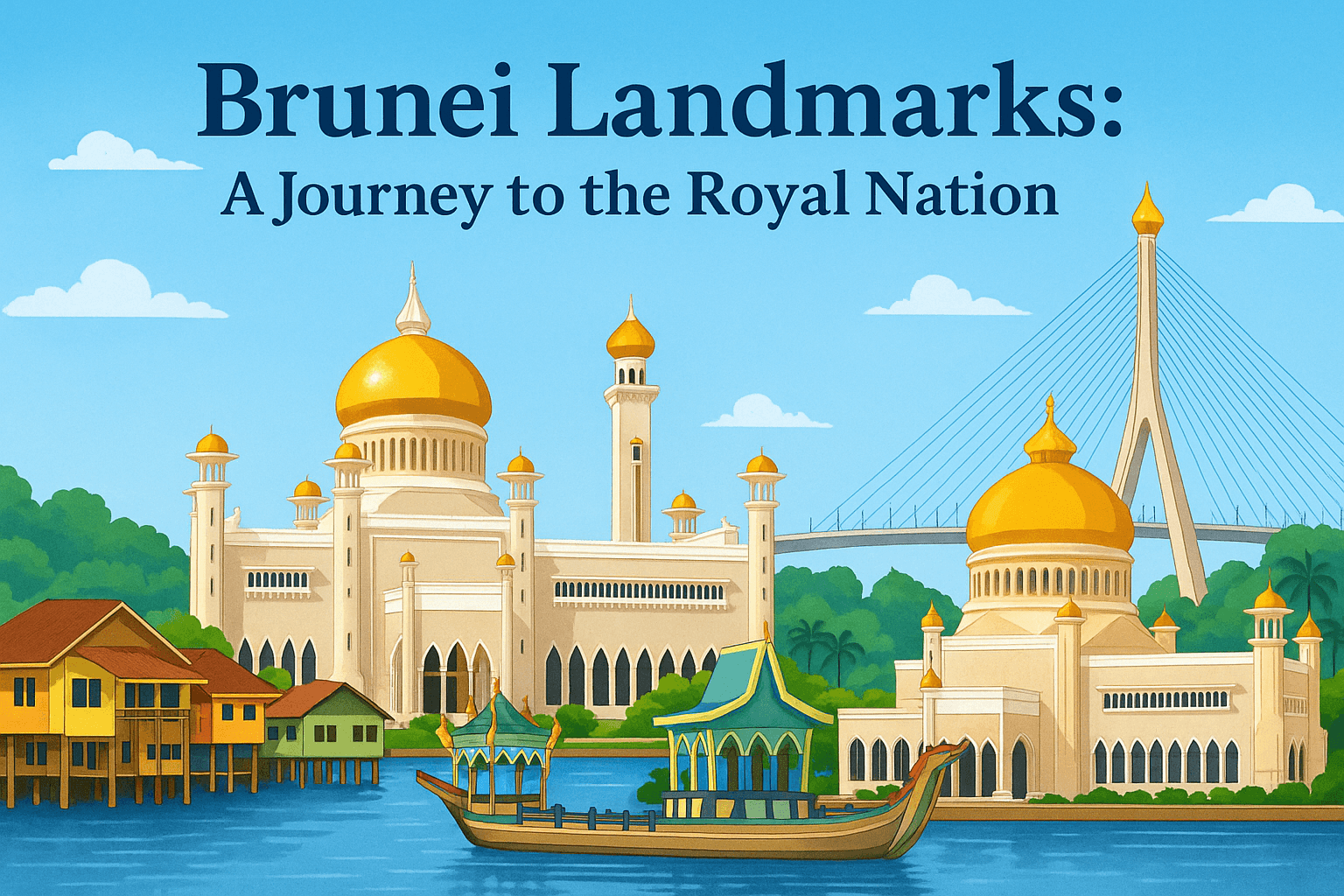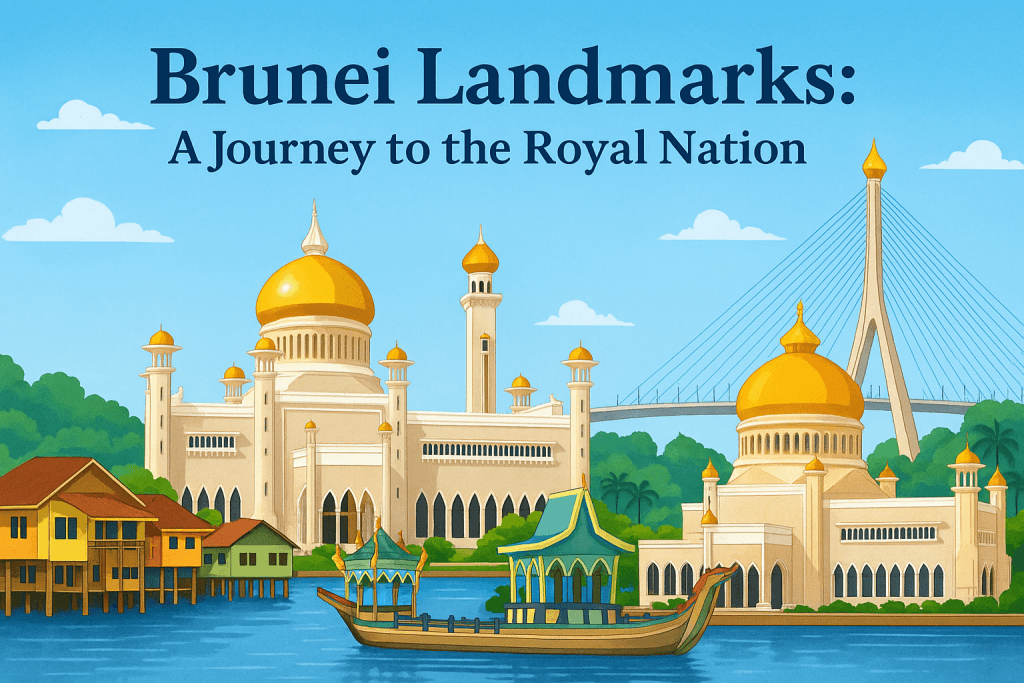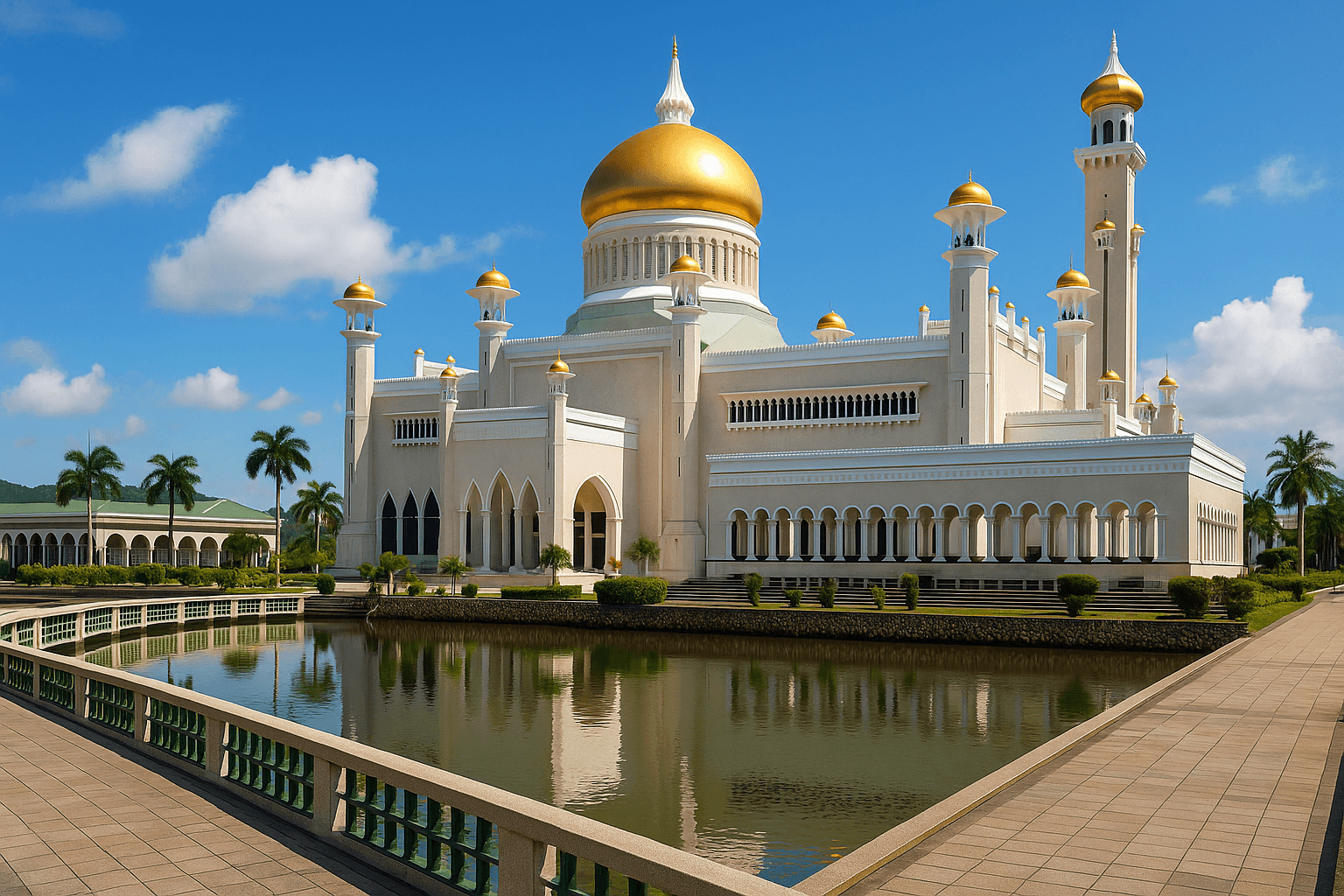Among the hidden gems of Southeast Asia lies Brunei Darussalam, a small yet culturally rich kingdom situated on the northern coast of Borneo. Known as the Abode of Peace, Brunei captivates visitors with its serene atmosphere, deep Islamic traditions, and architectural wonders. Exploring Brunei Landmarks: A Journey to the Royal Nation is more than sightseeing; it is an immersion into a royal heritage, cultural pride, and breathtaking artistry. From mosques glittering with gold domes to verdant parks and historical museums, each landmark narrates a story of faith, royalty, and national identity.
This article provides an in-depth exploration of Brunei Landmarks: A Journey to the Royal Nation, uncovering the most iconic sites while connecting their cultural and historical significance.

The Royal Essence of Brunei
The Sultan’s Influence on National Landmarks
The monarchy has shaped Brunei for centuries, and this is evident across the nation’s monuments. The Sultan’s vision for harmony between tradition and modernity inspires mosques, palaces, and civic institutions. When engaging with Brunei Landmarks: A Journey to the Royal Nation, one discovers how royal leadership translates into symbols of architectural beauty and national pride.
Symbolism in Brunei’s Architecture
Brunei’s landmarks harmonize Islamic design with Malay heritage and global modernism. Minarets rise majestically across the skyline, while domes glisten under tropical sun. Palatial residences balance ceremonial grandeur with functional governance. This synthesis forms the essence of Brunei Landmarks: A Journey to the Royal Nation, where tradition meets progress.
Mosques: Icons of Faith and Identity
Sultan Omar Ali Saifuddien Mosque
One cannot discuss Brunei Landmarks: A Journey to the Royal Nation without starting at Sultan Omar Ali Saifuddien Mosque. Built in 1958, it is an architectural masterpiece often considered among the most beautiful mosques in Asia. Its golden dome, marble minarets, and reflective lagoon make it an enduring image of Brunei. Inside, Italian marble floors, chandeliers, and stained glass enhance its sanctity.
Jame’ Asr Hassanil Bolkiah Mosque
Dedicated to the current Sultan, Jame’ Asr Hassanil Bolkiah Mosque stands as the largest in the country. Its 29 golden domes commemorate the 29th Sultan of Brunei. As part of Brunei Landmarks: A Journey to the Royal Nation, it highlights devotion, national unity, and the Sultan’s deep connection with his people.
Masjid Kampong Ayer
Floating within the world’s largest water village, Kampong Ayer, lies a mosque that reflects Brunei’s living heritage. It represents both spirituality and the resilience of riverside communities, making it essential in understanding Brunei Landmarks: A Journey to the Royal Nation.
The Royal Palace: Istana Nurul Iman
The grandeur of Brunei is epitomized by Istana Nurul Iman, the Sultan’s official residence and the world’s largest residential palace. With over a thousand rooms, banquet halls, and private mosques, it embodies royal prestige. Although closed most of the year, it opens during Hari Raya, allowing citizens to greet the Sultan. Visiting or even viewing the palace is central to Brunei Landmarks: A Journey to the Royal Nation because it represents both monarchy and generosity.
Historical and Cultural Museums
Royal Regalia Museum
The Royal Regalia Museum offers a journey through Brunei’s monarchical traditions. Exhibits include coronation regalia, gifts from foreign dignitaries, and artifacts tracing royal history. This museum is pivotal for travelers seeking deeper insights into Brunei Landmarks: A Journey to the Royal Nation.
Malay Technology Museum
The Malay Technology Museum showcases traditional crafts such as boat building, weaving, and metalworking. These skills represent the ingenuity of Brunei’s ancestors and highlight the balance between innovation and preservation.
Brunei History Centre
As a knowledge hub, the Brunei History Centre documents royal lineages and the nation’s evolution. Its contribution to Brunei Landmarks: A Journey to the Royal Nation lies in preserving national memory for future generations.
Kampong Ayer: The Water Village
Often called the Venice of the East, Kampong Ayer is a settlement built on stilts along the Brunei River. With schools, mosques, and shops interconnected by wooden walkways and water taxis, it exemplifies continuity of tradition. For visitors, exploring Kampong Ayer forms a significant part of Brunei Landmarks: A Journey to the Royal Nation, showcasing how heritage thrives alongside modern urban planning.
Natural Landmarks
Ulu Temburong National Park
Known as the Green Jewel of Brunei, Ulu Temburong National Park is an ecological treasure. A canopy walkway offers panoramic rainforest views, while pristine rivers highlight the nation’s biodiversity. As part of Brunei Landmarks: A Journey to the Royal Nation, it illustrates Brunei’s commitment to environmental conservation.
Tasek Lama Recreational Park
Close to the capital, Tasek Lama provides hiking trails, waterfalls, and natural reserves. It blends leisure with conservation, appealing to both residents and tourists.
Jerudong Park and Gardens
Although known as an amusement venue, Jerudong Park’s manicured landscapes reflect royal patronage and remain a unique inclusion within Brunei Landmarks: A Journey to the Royal Nation.
Colonial and Modern Structures
Lapau and Dewan Majlis
Lapau, the ceremonial hall for royal events, symbolizes the continuity of monarchy. Adjacent Dewan Majlis houses Brunei’s legislative functions. Together, they enrich Brunei Landmarks: A Journey to the Royal Nation by blending governance and culture.
Brunei Museum
While currently under renovation, the Brunei Museum holds ethnographic and natural history collections. It once stood as a key destination for understanding heritage.
International Convention Centre
Brunei’s engagement with global diplomacy is represented through the International Convention Centre. It illustrates how the kingdom positions itself on the international stage while maintaining traditional values.
Bridges and Infrastructure
Raja Isteri Pengiran Anak Hajah Saleha Bridge
This striking cable-stayed bridge connects districts across the Brunei River. It not only facilitates transportation but also enhances the nation’s skyline, symbolizing progress in Brunei Landmarks: A Journey to the Royal Nation.
Sungai Kebun Bridge
Opened in recent years, Sungai Kebun Bridge links Bandar Seri Begawan with the water village area, improving connectivity while preserving identity.
Educational and Religious Institutions
Universities, Islamic schools, and cultural centers form landmarks of knowledge. Universiti Brunei Darussalam and the Institute of Islamic Studies shape intellectual progress. As pillars of Brunei Landmarks: A Journey to the Royal Nation, these institutions demonstrate the kingdom’s investment in education rooted in values.
Markets and Civic Spaces
Gadong Night Market
The Gadong Night Market, filled with culinary delights, reflects community life. Though modern, it integrates with traditional customs, contributing to the landscape of Brunei Landmarks: A Journey to the Royal Nation.
Tamu Kianggeh Market
This riverside market has historical significance as a trading hub. Its stalls represent both livelihood and tradition.
Thematic Significance of Brunei’s Landmarks
Faith and Devotion
From mosques to palaces, faith underpins Brunei Landmarks: A Journey to the Royal Nation. Spiritual symbolism strengthens identity while guiding architectural beauty.
Royal Heritage
Royal leadership manifests not only in governance but also in national monuments. Palaces, museums, and ceremonial halls celebrate monarchy as an enduring institution.
Harmony with Nature
Natural parks, bridges, and riverside villages embody Brunei’s commitment to sustainability. Landmarks highlight harmony between modern infrastructure and natural landscapes.
Cultural Identity
Markets, museums, and schools highlight Malay Islamic Monarchy philosophy, which is the guiding principle of Brunei’s nationhood.
Conclusion
Exploring Brunei Landmarks: A Journey to the Royal Nation is an invitation to immerse in history, faith, and natural beauty. From golden domes reflecting spirituality to palatial halls showcasing royal traditions, every landmark tells a story of resilience and pride. Natural reserves echo Brunei’s commitment to the environment, while markets and villages preserve community spirit. Together, these elements form the mosaic of Brunei, a royal nation where tradition and progress coexist.
By journeying through these landmarks, one gains not just visual delight but also a deeper appreciation of Brunei’s national soul. The Abode of Peace stands proud, inviting the world to witness its treasures through Brunei Landmarks: A Journey to the Royal Nation.


